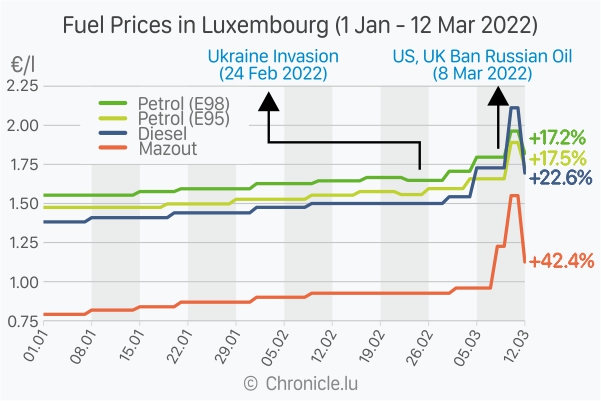
Fuel prices in Luxembourg dropped on Saturday 12 March 2022, for the first time this year, according to information published by the Ministry of the Economy.
The price of diesel quoted at €1.695 per litre on Saturday was down 41.7 Cents per litre (down 19.7%) from the all time high of €2.112 per litre on Thursday and Friday. Diesel still remains 22.6% higher than at the beginning of year when the price was €1.382 per litre.
At €1.733 per litre, the price of petrol (E95) dropped by 15.7 Cents per litre, down 8.3% from €1.890 per litre effective during previous two days.
Similarly, petrol (E98) prices, at €1.820 per litre, dropped by 14.37 Cents per litre, down 7.3% from €1.963 per litre the day before.
Both petrol (E95) and petrol (E98) are now 17.5% and 17.2% higher than at the beginning of the year (as of 1 January 2022).
Mazout (home heating oil) recorded the highest drop of 27.4%, priced at €1.126 per litre on Saturday. The price of heating oil remians 42.4% higher compared to the beginning of the year when it stood at €0.791 per litre.
The volatility in fuel prices stemming from Russia-Ukraine conflict remains high, following the Russian invasion on Thursday 24 february 2022.
On Thursday 3 March 2022, Luxembourg's Ministry of Energy and Spatial Planning announced that Luxembourg will take part in the joint voluntary action aimed at putting oil security stocks into circulation, amounting to 108,685 barrels of petroleum products to help cool down the soaring prices.
The joint action to withdraw up to 60 million barrels from emergency stocks of the International Energy Agency (IEA) member countries did not appear to have an immediate effect, as the Brent crude countinued to rise and peaked to $127.98 per barrel on Tuesday 8 March 2022, up $17.52 (15.9%) from $110.46 per barrel on Thursday 3 March 2022.
On Tuesday 8 March 2022, United States (US) announced ban on imports of Russian oil, liquefied natural gas and coal, and UK announced ban on all imports of Russian oil.
Same day, the European Commission proposed an outline of a plan to make Europe independent from Russian fossil fuels by 2027, starting with gas. The proposal included reducing the European Union (EU) demand for Russian gas by two thirds before the end of the year, but did not mention oil.
European Union, which gets around 40% of natural gas and 25% of oil from Russia, remains dependent on Russian supply without an immediate alternative. Russia announed that it will respect the current contracts in effect, taking some pressure off from the markets.
The Brent crude dropped to $106.02 per barrel on Thursday 10 March 2022, down 8.9% from the peak $127.98 on Tuesday 8 March 2022.
The Organisation of the Petroleum Exporting Countries (OPEC) and non-OPEC Ministerial Meeting, held on Wednesday 2 March 2022, announced to continue output according to the schedule. Without an immmediate increase in output from OPEC, which accounted for 37% of global crude oil production in 2020, the price volatility is likely to continue. The next OPEC and non-OPEC Ministerial Meeting meeting is scheduled for 31 March 2022.
Prices in Luxembourg include VAT.








